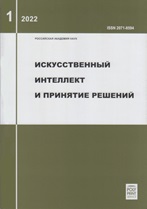|
This article is cited in 3 scientific papers (total in 3 papers)
Natural language processing
Creating a text analysis tool for socio-humanitarian research. P.1. Methodical and methodological aspects
S. N. Enikolopova, J. M. Kuznetsovab, I. V. Smirnovb, M. A. Stankevichb, N. V. Chudovab
a Mental Health Research Center of Russian Academy of Sciences, Moscow, Russia
b Federal Research Center "Computer Science and Control" of Russian Academy of Sciences, Moscow, Russia
Abstract:
The first part of the work conceptually examines applications of artificial intelligence in socio-humanitarian studies. The world trend of the last decades is focused on the involvement of social media data for research interests, which allows solving the tasks of monitoring, analysis, forecasting and management in relation to such parameters of network communication as opinions, attitudes, emotions, and behavior patterns of communicants. In order to develop tools for network content analysis, we propose to utilize the method for relational-situational analysis that based on the syntactic analysis approach by G.A. Zolotova and the concept of heterogeneous semantic networks proposed by G.S. Osipov. The proposed approach makes it possible to consider texts as the product of the author's speech-thinking activity, which allows applying Russian psychological research background to study cognitive processes, personality, motivation, emotional states, individual differences, and the general worldview.
Keywords:
socio-humanitarian research, artificial intelligence, automatic text analysis, relationalsituational analysis, predicate-argument structure.
Citation:
S. N. Enikolopov, J. M. Kuznetsova, I. V. Smirnov, M. A. Stankevich, N. V. Chudova, “Creating a text analysis tool for socio-humanitarian research. P.1. Methodical and methodological aspects”, Artificial Intelligence and Decision Making, 2019, no. 2, 28–38; Scientific and Technical Information Processing, 47:6 (2020), 358–364
Linking options:
https://www.mathnet.ru/eng/iipr167 https://www.mathnet.ru/eng/iipr/y2019/i2/p28
|

|




 Contact us:
Contact us: Terms of Use
Terms of Use
 Registration to the website
Registration to the website Logotypes
Logotypes








 Citation in format
Citation in format 
